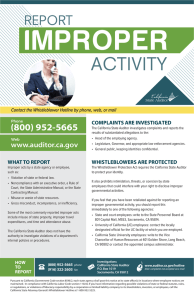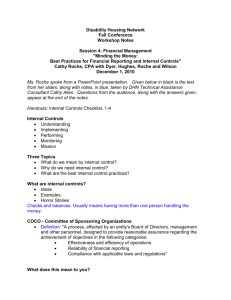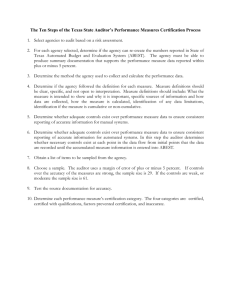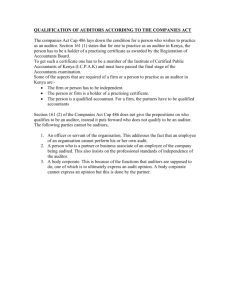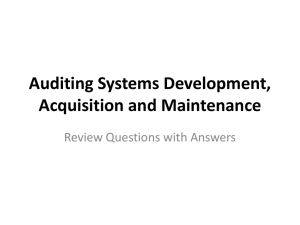Investigative Audits & Reports: Access, Disclosures, and Enforcement
advertisement
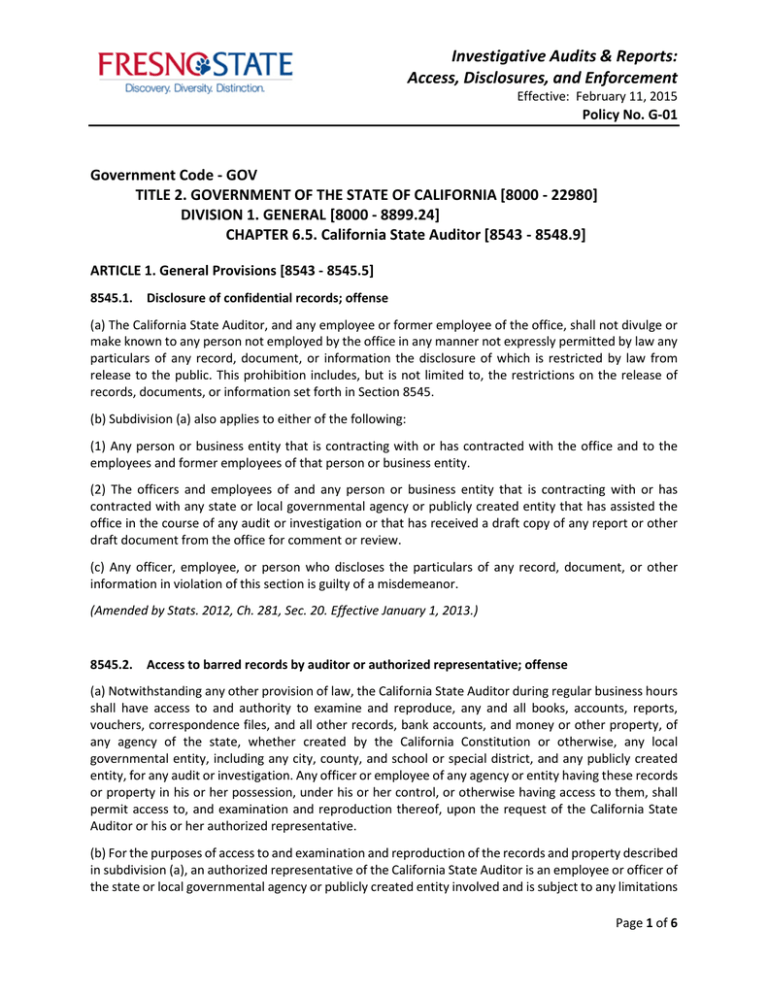
Investigative Audits & Reports: Access, Disclosures, and Enforcement Effective: February 11, 2015 Policy No. G-01 Government Code - GOV TITLE 2. GOVERNMENT OF THE STATE OF CALIFORNIA [8000 - 22980] DIVISION 1. GENERAL [8000 - 8899.24] CHAPTER 6.5. California State Auditor [8543 - 8548.9] ARTICLE 1. General Provisions [8543 - 8545.5] 8545.1. Disclosure of confidential records; offense (a) The California State Auditor, and any employee or former employee of the office, shall not divulge or make known to any person not employed by the office in any manner not expressly permitted by law any particulars of any record, document, or information the disclosure of which is restricted by law from release to the public. This prohibition includes, but is not limited to, the restrictions on the release of records, documents, or information set forth in Section 8545. (b) Subdivision (a) also applies to either of the following: (1) Any person or business entity that is contracting with or has contracted with the office and to the employees and former employees of that person or business entity. (2) The officers and employees of and any person or business entity that is contracting with or has contracted with any state or local governmental agency or publicly created entity that has assisted the office in the course of any audit or investigation or that has received a draft copy of any report or other draft document from the office for comment or review. (c) Any officer, employee, or person who discloses the particulars of any record, document, or other information in violation of this section is guilty of a misdemeanor. (Amended by Stats. 2012, Ch. 281, Sec. 20. Effective January 1, 2013.) 8545.2. Access to barred records by auditor or authorized representative; offense (a) Notwithstanding any other provision of law, the California State Auditor during regular business hours shall have access to and authority to examine and reproduce, any and all books, accounts, reports, vouchers, correspondence files, and all other records, bank accounts, and money or other property, of any agency of the state, whether created by the California Constitution or otherwise, any local governmental entity, including any city, county, and school or special district, and any publicly created entity, for any audit or investigation. Any officer or employee of any agency or entity having these records or property in his or her possession, under his or her control, or otherwise having access to them, shall permit access to, and examination and reproduction thereof, upon the request of the California State Auditor or his or her authorized representative. (b) For the purposes of access to and examination and reproduction of the records and property described in subdivision (a), an authorized representative of the California State Auditor is an employee or officer of the state or local governmental agency or publicly created entity involved and is subject to any limitations Page 1 of 6 Investigative Audits & Reports: Access, Disclosures, and Enforcement Effective: February 11, 2015 Policy No. G-01 on release of the information as may apply to an employee or officer of the state or local governmental agency or publicly created entity. For the purpose of conducting any audit or investigation, the California State Auditor or his or her authorized representative shall have access to the records and property of any public or private entity or person subject to review or regulation by the public agency or public entity being audited or investigated to the same extent that employees or officers of that agency or public entity have access. No provision of law providing for the confidentiality of any records or property shall prevent disclosure pursuant to subdivision (a), unless the provision specifically refers to and precludes access and examination and reproduction pursuant to subdivision (a). Providing confidential information to the California State Auditor pursuant to this section, including, but not limited to, confidential information that is subject to a privilege, shall not constitute a waiver of that privilege. This subdivision does not apply to records compiled pursuant to Part 1 (commencing with Section 8900) or Part 2 (commencing with Section 10200) of Division 2. (c) Any officer or person who fails or refuses to permit access and examination and reproduction, as required by this section, is guilty of a misdemeanor. (d) For purposes of this section “confidentiality of records or property” means that the record or property may lawfully be kept confidential as a result of a statutory or common law privilege or any other provision of law. (Amended by Stats. 2012, Ch. 281, Sec. 21. Effective January 1, 2013.) 8545.3. Release of records prohibited from disclosure; offense It is a misdemeanor for the California State Auditor or any employee of the California State Auditor to release any information received pursuant to Section 10850 of the Welfare and Institutions Code or that is otherwise prohibited by law to be disclosed. (Amended by Stats. 2012, Ch. 281, Sec. 22. Effective January 1, 2013.) 8545.4. Audits or investigative audits; powers of auditor or designee (a) In connection with any audit or investigation conducted by the California State Auditor, the California State Auditor, or his or her designee, may do any of the following: (1) Administer oaths. (2) Certify to all official acts. (3) Issue subpoenas for the attendance of witnesses and the production of papers, books, accounts, or documents, or for the making of oral or written sworn statements, in any interview conducted as part of an audit or investigation. (b) Any subpoena issued under this section extends as process to all parts of the state and may be served by any person authorized to serve process of courts of record or by any person designated for that purpose by the California State Auditor or his or her designee. The person serving this process may receive Page 2 of 6 Investigative Audits & Reports: Access, Disclosures, and Enforcement Effective: February 11, 2015 Policy No. G-01 compensation as allowed by the California State Auditor or his or her designee, not to exceed the fees prescribed by law for similar service. (c) Notwithstanding Section 7470, 7474, or 7491, subpoenas issued under this section for financial records of financial institutions concerning customers of financial institutions or for information contained in those records shall not be subject to the requirement or conditions of Section 7474. (Amended by Stats. 2012, Ch. 281, Sec. 23. Effective January 1, 2013.) ARTICLE 3. California Whistleblower Protection Act [8547 - 8547.15] 8547.5. Investigative audits (a) The State Auditor shall create the means for the submission of allegations of improper governmental activity both by transmission via mail or other carrier to a specified mailing address and electronic submission through an Internet Web site portal. The State Auditor may request that a person submitting an allegation provide his or her name and contact information and provide the names and contact information for any persons who could help to substantiate the claim. However, the State Auditor shall not require any person submitting an allegation to provide his or her name or contact information and shall clearly state on the agency Internet Web site that this information is not required in order to submit an allegation. (b) Upon receiving specific information that any employee or state agency has engaged in an improper governmental activity, the State Auditor may conduct an investigation of the matter. The identity of the person providing the information that initiated the investigation, or of any person providing information in confidence to further an investigation, shall not be disclosed without the express permission of the person providing the information except that the State Auditor may make the disclosure to a law enforcement agency that is conducting a criminal investigation. (Amended by Stats. 2011, Ch. 328, Sec. 6. Effective January 1, 2012.) 8547.6. Assistance in conduct of investigative audits (a) The State Auditor may request the assistance of any state department, agency, or employee in evaluating an allegation or conducting any investigation of an improper governmental activity as authorized by this article. In response to a request for assistance from the State Auditor, that state department, agency, or employee shall provide the assistance, including, but not limited to, providing access to documents or other information in a timely manner, as required by Section 8545.2. If an investigation conducted by the State Auditor involves access to confidential academic peer review records of University of California academic personnel, these records shall be provided in a form consistent with university policy effective on August 1, 1992. No information obtained from the State Auditor by any department, agency, or employee as a result of the State Auditor’s request for assistance, nor any information obtained thereafter as a result of further investigation, shall be divulged or made known to any person without the prior approval of the State Auditor. Page 3 of 6 Investigative Audits & Reports: Access, Disclosures, and Enforcement Effective: February 11, 2015 Policy No. G-01 (b) As an alternative to conducting its own investigation, if the State Auditor determines that there is reasonable cause to believe that a state agency or employee may have engaged in an improper governmental activity, the State Auditor, subject to the limitations of Section 8547.5, may refer the allegation to the involved state agency, or to another state agency having direct oversight of the involved state agency, to conduct an investigation of the allegation under the State Auditor’s supervision. If the State Auditor refers an allegation to the involved state agency or to another state agency having direct oversight of the involved state agency, that state agency shall investigate the allegation and report the results of the investigation to the State Auditor within 60 days of the referral and monthly thereafter until final action has been taken. In addition, whenever the State Auditor determines that there is reasonable cause to believe that a state agency or employee may have engaged in an improper governmental activity, the State Auditor, subject to the limitations of Section 8547.5, may refer the allegation to a criminal or administrative law enforcement agency in lieu of conducting or supervising an investigation of the matter. (Amended by Stats. 2011, Ch. 328, Sec. 7. Effective January 1, 2012.) 8547.7. Report of improper governmental activities; enforcement authority (a) If, after investigating an allegation, the State Auditor finds that a state agency or employee may have engaged or participated in an improper governmental activity, he or she shall prepare an investigative report and send a copy of that report to the head of the agency involved and to the head of any other agency that has direct oversight over that involved agency. The investigative report may include the State Auditor’s recommended actions to prevent the continuation or recurrence of the activity. If appropriate, the State Auditor shall report this information to the Attorney General, the policy committees of the Senate and Assembly having jurisdiction over the subject involved, and to any other authority that the State Auditor determines appropriate. Subject to the limitations of Section 8547.5, the State Auditor may provide to the involved agency any evidence gathered during the investigation that, in the judgment of the State Auditor, is necessary to support any of the recommendations. Within 60 days of receiving the State Auditor’s investigative report, the involved agency shall report to the State Auditor any actions that it has taken or that it intends to take to implement the recommendations. The agency shall file subsequent reports on a monthly basis until final action has been taken. (b) The State Auditor shall not have any enforcement power. In any case in which the State Auditor finds that a state agency or employee may have engaged in an improper governmental activity, the State Auditor may provide the finding, and any evidence supporting the finding, subject to the limitations of Section 8547.5, to a criminal law enforcement agency, an administrative law enforcement agency, or a licensing agency that has authority to investigate the matter. (c) The State Auditor shall keep confidential every investigation, including, but not limited to, all investigative files and work product, except that the State Auditor, whenever he or she determines it necessary to serve the interests of the state, and subject to the limitations of Section 8547.5, may issue a public report of an investigation that has substantiated an improper governmental activity, keeping confidential the identity of the employee or employees involved. In addition, subject to the limitations of Section 8547.5, the State Auditor may release any findings or evidence supporting any findings resulting from an investigation conducted pursuant to this article whenever the State Auditor determines it necessary to serve the interests of the state. Page 4 of 6 Investigative Audits & Reports: Access, Disclosures, and Enforcement Effective: February 11, 2015 Policy No. G-01 (d) This section does not limit any authority conferred upon the Attorney General or any other department or agency of government to investigate any matter. (Amended by Stats. 2011, Ch. 328, Sec. 8. Effective January 1, 2012.) 8547.8. Reprisals or other improper acts for disclosure of improper governmental activities; complaints; limitation of actions; civil and criminal penalties (a) A state employee or applicant for state employment who files a written complaint with his or her supervisor, manager, or the appointing power alleging actual or attempted acts of reprisal, retaliation, threats, coercion, or similar improper acts prohibited by Section 8547.3, may also file a copy of the written complaint with the State Personnel Board, together with a sworn statement that the contents of the written complaint are true, or are believed by the affiant to be true, under penalty of perjury. The complaint filed with the board, shall be filed within 12 months of the most recent act of reprisal complained about. (b) Any person who intentionally engages in acts of reprisal, retaliation, threats, coercion, or similar acts against a state employee or applicant for state employment for having made a protected disclosure, is subject to a fine not to exceed ten thousand dollars ($10,000) and imprisonment in the county jail for a period not to exceed one year. Pursuant to Section 19683, any state civil service employee who intentionally engages in that conduct shall be disciplined by adverse action as provided by Section 19572. (c) In addition to all other penalties provided by law, any person who intentionally engages in acts of reprisal, retaliation, threats, coercion, or similar acts against a state employee or applicant for state employment for having made a protected disclosure shall be liable in an action for damages brought against him or her by the injured party. Punitive damages may be awarded by the court where the acts of the offending party are proven to be malicious. Where liability has been established, the injured party shall also be entitled to reasonable attorney’s fees as provided by law. However, any action for damages shall not be available to the injured party unless the injured party has first filed a complaint with the State Personnel Board pursuant to subdivision (a), and the board has issued, or failed to issue, findings pursuant to Section 19683. (d) This section is not intended to prevent an appointing power, manager, or supervisor from taking, directing others to take, recommending, or approving any personnel action or from taking or failing to take a personnel action with respect to any state employee or applicant for state employment if the appointing power, manager, or supervisor reasonably believes any action or inaction is justified on the basis of evidence separate and apart from the fact that the person has made a protected disclosure as defined in subdivision (b) of Section 8547.2. (e) In any civil action or administrative proceeding, once it has been demonstrated by a preponderance of evidence that an activity protected by this article was a contributing factor in the alleged retaliation against a former, current, or prospective employee, the burden of proof shall be on the supervisor, manager, or appointing power to demonstrate by clear and convincing evidence that the alleged action would have occurred for legitimate, independent reasons even if the employee had not engaged in protected disclosures or refused an illegal order. If the supervisor, manager, or appointing power fails to Page 5 of 6 Investigative Audits & Reports: Access, Disclosures, and Enforcement Effective: February 11, 2015 Policy No. G-01 meet this burden of proof in an adverse action against the employee in any administrative review, challenge, or adjudication in which retaliation has been demonstrated to be a contributing factor, the employee shall have a complete affirmative defense in the adverse action. (f) Nothing in this article shall be deemed to diminish the rights, privileges, or remedies of any employee under any other federal or state law or under any employment contract or collective bargaining agreement. (Amended by Stats. 2001, Ch. 883, Sec. 3. Effective January 1, 2002.) 8547.9. Working papers pertaining to an investigative report Notwithstanding Section 19572, if the State Personnel Board determines that there is a reasonable basis for an alleged violation, or finds an actual violation of Section 8547.3 or 19683, it shall transmit a copy of the investigative report to the State Auditor. All working papers pertaining to the investigative report shall be made available under subpoena in a civil action brought under Section 19683. (Added by Stats. 1993, Ch. 12, Sec. 8. Effective May 7, 1993.) If you have any questions related to these sections of the California Government Code, please contact the Chief Financial Officer at 559.278.2083. ___________________________ Relevant sections of the Government Code were accessed on February 11, 2015. Page 6 of 6
